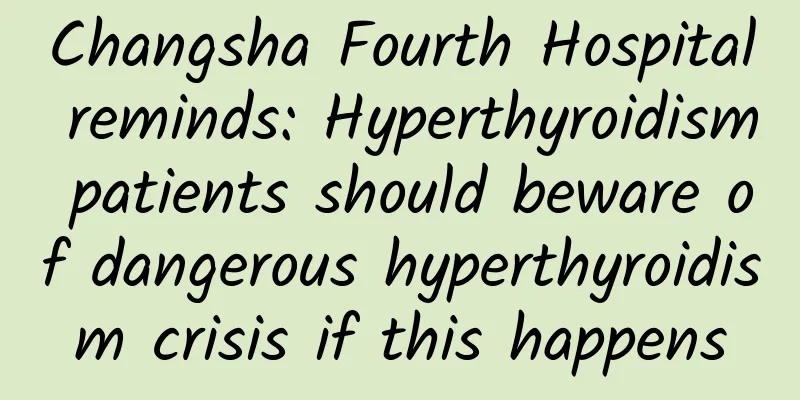Changsha Fourth Hospital reminds: Hyperthyroidism patients should beware of dangerous hyperthyroidism crisis if this happens

|
Mr. Li, 41, has suffered from hyperthyroidism for more than 7 years. He usually feels good and doesn't pay much attention to it. He even stopped taking anti-thyroid drugs. Recently, Mr. Li suddenly developed a high fever, with the highest temperature reaching 39.5℃ and shortness of breath. At first, he thought he had caught a cold. But Mr. Li gradually became drowsy, and his family immediately sent him to the Emergency Center of the Binshui New City Campus of Changsha Fourth Hospital . When he arrived at the hospital, Mr. Li was already confused and his heart rate reached 170 beats per minute. After completing relevant examinations and consultation and evaluation by an endocrinologist, according to the BWPS score of hyperthyroidism crisis, it was 55 points, which was already a thyroid crisis (hyperthyroidism crisis). At this time, Mr. Li had severe liver dysfunction and leukopenia, and his condition was very critical! The endocrinologist team of the Binshui New City Campus of Changsha Fourth Hospital acted decisively and, under the guidance of Song Junhua, director of the endocrinology department and chief physician , quickly contacted the nephrology department for blood filtration, and worked with other multidisciplinary teams to provide comprehensive treatments such as hormone shock, antiviral, anti-inflammatory, liver protection, and maintenance of water and electrolyte balance. Fortunately, Mr. Li's condition gradually improved. At present, the patient's condition is stable and he has been discharged smoothly. The question is, what is hyperthyroidism crisis? Why does hyperthyroidism cause such a fatal condition? What are the symptoms, and how to deal with hyperthyroidism crisis once it occurs? Today, Director Song Junhua will take you to know this extreme state of hyperthyroidism - hyperthyroidism crisis. 1. What is hyperthyroid crisis? Thyroid crisis, also known as hyperthyroid crisis, is a syndrome of acute exacerbation of thyrotoxicosis. It refers to a sudden increase in the amount of functional thyroid hormone in the blood circulation, or an increase in the body's sensitivity to thyroid hormone, which leads to a sharp worsening of the disease and even life-threatening serious complications. Multiple organ failure is a common cause of death in hyperthyroid crisis, which requires early identification and emergency treatment. 2. What are the symptoms of hyperthyroid crisis? The clinical manifestations of hyperthyroid crisis include high fever, tachycardia, arrhythmia, loss of appetite, nausea, vomiting, diarrhea, and some patients suffer from jaundice and liver damage. Patients may become restless, agitated, have incorrect or incomplete cognition of their own condition or surrounding environment, and may experience anxiety and hallucinations. In severe cases, delirium and coma may occur. 3. What are the causes of thyroid crisis? There are certain predisposing factors for the occurrence of hyperthyroid crisis. Surgical factors: surgery is performed when the hyperthyroidism is not under control, such as goiter removal, cesarean section, artificial abortion, appendectomy, etc. Other physical conditions occur while suffering from hyperthyroidism, such as various traumas (burns, car accidents, etc.). Internal medical causes: infection, mainly upper respiratory tract infection, followed by gastrointestinal and urinary tract infection. Occasionally, there are skin infections and peritonitis. Some stress states, such as mental tension, overwork, heart failure, angina pectoris, hunger, drug reactions (such as drug allergy, digitalis poisoning, drug-induced hypoglycemia), diabetic ketoacidosis, and childbirth can induce hyperthyroid crisis. Song Junhua, deputy director and chief physician of the Endocrinology Department of Changsha Fourth Hospital, kindly reminds: Patients with hyperthyroidism should pay attention to taking anti-thyroid drugs regularly as prescribed by their doctor, go to the outpatient clinic for regular follow-up visits, and avoid suddenly stopping the medication on your own to avoid irreversible consequences! Hunan Medical Chat Special Author: Zhu Hangyi from Changsha Fourth Hospital Follow @湖南医聊 to get more health science information! (Edited by Wx) |
<<: Do your homework! Here are some facts you must know about diabetic foot!
>>: Wrist pain and stiff fingers? Changsha Fourth Hospital helps you get rid of "tenosynovitis"
Recommend
How to prevent uterine prolapse
Uterine prolapse is a topic that women are more c...
Night Listening | This is a common summer fruit. Be careful of "poisoning" if you eat too much, which can be fatal in severe cases!
It is the season for eating lychees again. As the...
Do I need to fast for the 28th week of pregnancy checkup?
When a woman is pregnant to the later stage, she ...
What are the yoga poses for breast enhancement?
As we all know, regular yoga practice can adjust ...
How can girls reduce back fat in daily life?
Nowadays, most female friends have entered a stag...
Is it okay to have sex 40 days after a normal birth?
Many couples will reduce sexual intercourse after...
League of Legends server crashed on February 15th. League of Legends Ionia Black Rose is under maintenance. What should I do?
On February 15, many LOL players reported that th...
How to treat sagging breasts in women
Many female friends will face the phenomenon of s...
Is it true that MINISO offers 50 off for every 100 spent? When will the MINISO 100-50 off promotion end?
Is it true that MINISO offers 100-50 off for purc...
What is the normal range of human epitesticular protein 4?
Ovaries are very important to women. If the ovari...
National Liver Care Day: What you don’t know about liver disease
There are three vaccines in China that can preven...
iSuppli: Global smartphone shipments forecast to reach 1.03 billion in 2015
According to research firm IHS (formerly iSuppli)...
Elimination of residual material after medical abortion
After medical abortion, some lochia can be comple...









